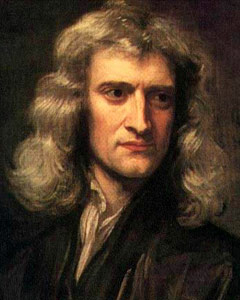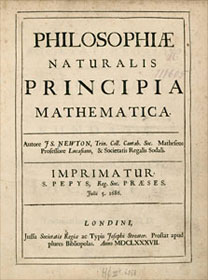
Sir Isaac Newton
1642 - 1727
English mathematician and physicist and inventor of calculus.
Formulator of the three fundamental laws of motion also known as Newton's laws.
Considered to be one of the greatest scientists in history.

Sir Isaac Newton was an English mathematician and physicist from a poor farming family in. He was born on December 25, 1642, at Woolsthorpe, near Grantham in Lincolnshire. Newton was a poor farmer and was eventually sent to Trinity College at Cambridge University to study and become a preacher. While at Cambridge, Newton pursued his own interests and studied mathematics and philosophy. He received his bachelor's degree in 1665 and was later forced to leave Cambridge when it was closed due to the plague. He returned in 1667 and was elected to a fellowship. Newton received his master's degree in 1668.
Newton is considered to be one of the greatest scientists in history. He made important contributions to many fields of science. Unfortunately the famous story of Newton and the apple seem to be based more on fiction rather than fact. His discoveries and theories laid the foundation for much of the progress in science since his time. Newton was one of the inventors of the branch of mathematics called calculus. He also solved the mysteries of light and optics, formulated the three laws of motion, and derived from them the law of universal gravitation. Newton's laws of motion are the most fundamental natural laws of classical mechanics. In 1686, Newton stated these laws in his book Principia Mathematica. Taken together, these three laws of motion underlie all interactions of force, matter, and motion except those involving relativistic and quantum effects:
- Newton's first law of motion is the Law of Inertia. It states that an object at rest tends to stay at rest unless acted upon by an outside force.
- Newton's second law of motion establishes a relationship between the unbalanced force applied to an object and the resultant acceleration of the object. (In other words, force equals mass times acceleration, or F=ma.)
- Newton's third law of motion, which is also known as the principle of action and reaction, states for that every action, there is an equal but opposite reaction.
After suffering a nervous breakdown in 1693, Newton retired from research to seek a government position in London. In 1696 he became Warden of the Royal Mint. In 1708, Newton was knighted by Queen Anne, the first scientist to be so honored for his work. From that point on he was known as Sir Isaac Newton and devoted much of his leisure to theology. He wrote at great length on prophecies and predictions, subjects which had always been of interest to him. In 1703 he was elected president of the Royal Society and was reelected each year until his death on March 20, 1727.




